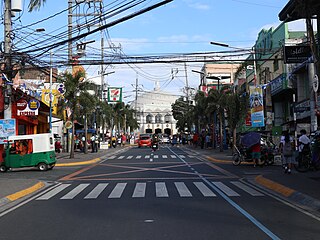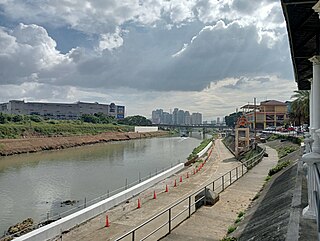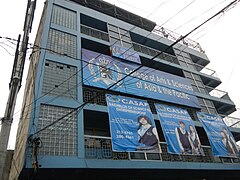
Metropolitan Manila, commonly shortened to Metro Manila and formally the National Capital Region, is the capital region and largest metropolitan area of the Philippines. Located on the eastern shore of Manila Bay, the region lies between the Central Luzon and Calabarzon regions. Encompassing an area of 636.00 km2 (245.56 sq mi) and with a population of 13,484,462 as of 2020, it consists of sixteen highly urbanized cities: the capital city, Manila, Caloocan, Las Piñas, Makati, Malabon, Mandaluyong, Marikina, Muntinlupa, Navotas, Parañaque, Pasay, Pasig, Quezon City, San Juan, Taguig, and Valenzuela, along with one independent municipality, Pateros. As the second most populous and the most densely populated region in the Philippines, it ranks as the 9th most populous metropolitan area in Asia and the 6th most populous urban area in the world.

Rizal, officially the Province of Rizal, is a province in the Philippines located in the Calabarzon region in Luzon. Its capital is the city of Antipolo. It is about 16 kilometers (9.9 mi) east of Manila. The province is named after José Rizal, one of the main national heroes of the Philippines. It is bordered by Metro Manila to the west, Bulacan to the north, Quezon to the east and Laguna to the southeast. The province also lies on the northern shores of Laguna de Bay, the largest lake in the country. Rizal is a mountainous province perched on the western slopes of the southern portion of the Sierra Madre mountain range.

Rodriguez, officially the Municipality of Rodriguez and commonly known by its former name Montalban, is a 1st class urban municipality in the province of Rizal, Philippines. According to the 2020 census, it has a population of 443,954 people making it the most populous municipality in the country. Pending an affirmation through plebiscite, Republic Act No. 11812 repealed Batas Pambansa Blg. 275 and intend to formally revert to its original municipal name Montalban.

Pasig, officially the City of Pasig, is a highly urbanized city in the National Capital Region of the Philippines. According to the 2020 census, it has a population of 803,159 people.

Marikina, officially the City of Marikina, is a highly urbanized city in the National Capital Region of the Philippines. According to the 2020 census, it has a population of 456,159 people.

Antipolo, officially the City of Antipolo, is a 1st class component city and capital of the province of Rizal, Philippines. According to the 2020 census, it has a population of 887,399 people. It is the most populous city in Rizal Province and in Calabarzon region, and the seventh most-populous city in the Philippines. It is also the most populated city under the component city status.

San Mateo, officially the Municipality of San Mateo, is a 1st class urban municipality in the province of Rizal, Philippines. According to the 2020 census, it has a population of 273,306.

Cainta, officially the Municipality of Cainta, is a 1st class urban municipality in the province of Rizal, Philippines. According to the 2020 census, it has a population of 376,933 people.

Taytay, officially the Municipality of Taytay, is a 1st class urban municipality in the province of Rizal, Philippines. It is also known as the Garments Capital of the Philippines.

The Marikina River is a river in eastern Metro Manila, Philippines. It is the largest tributary of the Pasig River, with headwaters located in the Sierra Madre Mountains in Rodriguez, Rizal province.
Siena College of Taytay, also referred to by its acronym SCT, is a private, non-profit Catholic basic and higher education institution run by the Congregation of the Dominican Sisters of St. Catherine of Siena in Taytay, Rizal, Philippines. It was named St. Catherine Academy at foundation in 1957 by the Dominican Sisters of Siena and it is one of six Dominican educational institutions in the Philippines. Its sister schools are Siena College of Quezon City, Siena College of San Jose, Siena College of Hermosa, and Siena College of Tigaon.

Manila, also known as Tondo until 1859, was a province of the Philippines that encompassed the former pre-Hispanic polities of Tondo, Maynila, and Namayan. In 1898, it comprised the city of Manila and 23 other municipalities. In 1901, the province was dissolved, with the city of Manila absorbing six of its smaller neighboring municipalities. The remaining part was merged with the adjacent district of Morong to form the province of Rizal.

Ortigas Avenue is a 12.1 km (7.5 mi) highway connecting eastern Metro Manila and western Rizal in the Philippines. It is one of the busiest highways in Metro Manila, serving as the main thoroughfare of the metro's east–west corridor, catering mainly to traffic to and from Rizal.

The Upper Marikina River Basin Protected Landscape is a protected area in the Province of Rizal in the Philippines, which forms the upper area of the drainage basin of the Marikina River.

SM City San Mateo is a shopping mall owned by the largest mall developer in the Philippines, SM Prime Holdings. It is located along Gen. Luna Avenue, Brgy. Ampid 1, San Mateo, Rizal. This first major mall of San Mateo opens on May 15, 2015, being the fourth SM Supermall in Rizal Province after SM City Taytay, SM City Masinag and SM Center Angono, and the 52nd SM Supermall in the country. The mall is designed by JRP Design Inc., a local architectural design firm in Ayala Alabang, Muntinlupa and DSGN associates, a firm based in Dallas, Texas, United States, which also designed SM City Marikina.

















